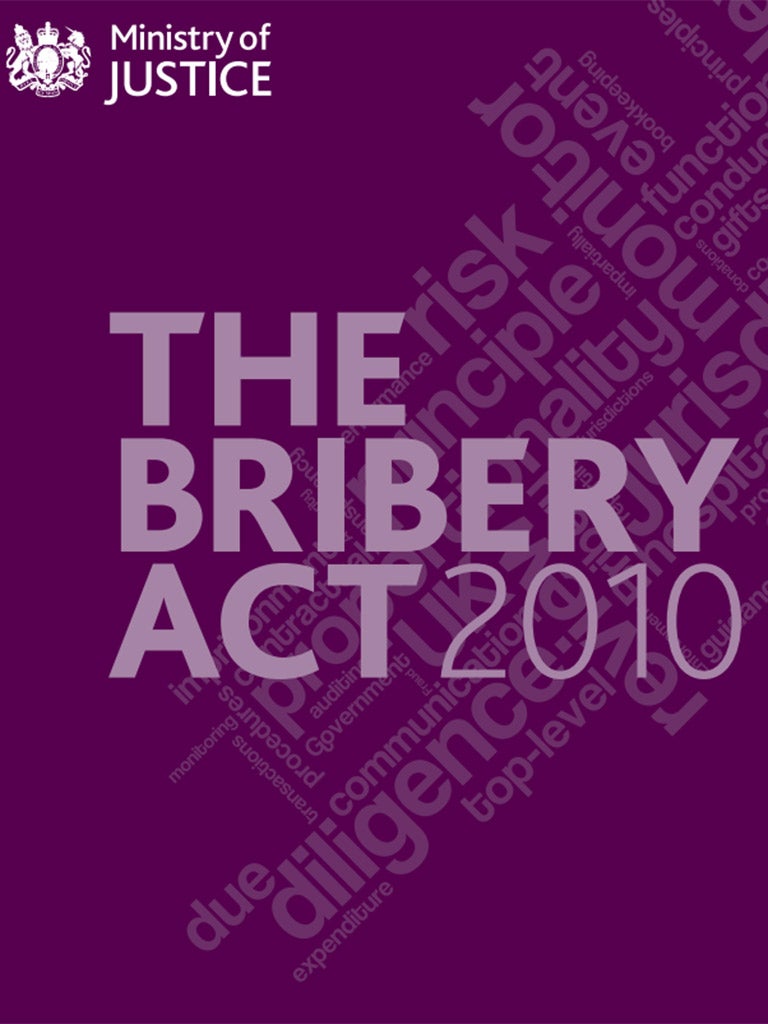Anti-corruption campaigners furious as Government considers softening Bribery Act
Businesses claim the law makes it difficult for British firms to export goods

Your support helps us to tell the story
From reproductive rights to climate change to Big Tech, The Independent is on the ground when the story is developing. Whether it's investigating the financials of Elon Musk's pro-Trump PAC or producing our latest documentary, 'The A Word', which shines a light on the American women fighting for reproductive rights, we know how important it is to parse out the facts from the messaging.
At such a critical moment in US history, we need reporters on the ground. Your donation allows us to keep sending journalists to speak to both sides of the story.
The Independent is trusted by Americans across the entire political spectrum. And unlike many other quality news outlets, we choose not to lock Americans out of our reporting and analysis with paywalls. We believe quality journalism should be available to everyone, paid for by those who can afford it.
Your support makes all the difference.The Government is reviewing the Bribery Act after business leaders claimed it was making it difficult for British firms to export goods.
The Business Secretary, Sajid Javid, is inviting companies to comment on whether the tough anti-corruption measures are “a problem”.
Critics fear it is a way of weakening the law at a time when the Government should be clamping down on existing loopholes, and supporters of the Act say they are surprised by the move.
They warn that any attempt to water down the Act will seriously damage the UK’s credibility on corruption. They also claim it is undermining David Cameron’s tough personal anti-bribery message, which he reinforced during his visit to South-east Asia to drum up business for Britain.
Letters sent by the Department for Business, Innovation and Skills (BIS) invite industry leaders to comment on whether the Act has had an impact on their attempts to export. They also ask if guidance issued to help business people avoid problems under the Act is useful and for suggestions to clarify the information. BIS officials said the guidance that accompanies the Act, rather than the law itself, was the main focus.
Following widespread international criticism of the UK’s failure to reform its ineffective anti-bribery laws, the Act was regarded as one of the most controversial laws passed by the last government.
The Coalition boasted it was the world’s “toughest” anti-corruption law. But the Confederation of British Industry led fierce criticism of the Bill and argued it would restrict economic growth.
Opponents continued to lobby against aspects of it after it passed into law in 2011. They claim UK law goes “above and beyond international standards” and puts British business at a disadvantage against their competitors.
Critics say US anti-bribery law does not make facilitation payments – cash or goods paid to a foreign government official to perform or speed up their duties – illegal.
They say ambiguity about what constitutes improper hospitality threatens to embroil unsuspecting businessmen in corruption investigations.
However, the OECD called on Britain to tighten its guidelines, which it said created loopholes for corruption and bribery to go unchecked.
The Bond group, a coalition of anti-corruption campaign groups, said the Government urgently needed to consult more widely. It was also concerned about any relaxation of the law regarding facilitation payments.
“These payments are illegal in most countries. To make it legal for UK companies to pay would undermine the law in those countries as well as global efforts to eradicate corruption,” a spokesman said.
“Consulting the business community in this way sends entirely the wrong message. as to the government’s commitment to uphold the Bribery Act and any weakening of the guidance, such as exemptions for facilitation payments, will seriously damage the UK’s credibility.”
Accountant BDO claimed last year that some firms find it difficult to export because of the Act. It called for a government review and a fresh set of guidelines and recommendations “clarifying the purpose, intent and scope of the Act”.
“The UK is rightly leading the charge against global corruption, which is morally wrong and distorts markets. However, the unintended consequences of the Act can limit mid-sized businesses’ international expansion,” it added.

But the anti-corruption campaigner Transparency International said that corporate lobbying appeared to be the basis for the review rather than evidence. It said that 89 per cent of companies surveyed in the Government’s own research, released earlier this month, reported that the Act (left) had no impact on their ability to export.
The activists point out that no one has yet been prosecuted for facilitation payments in the UK and that there is a low risk of prosecution.
The Serious Fraud Office said it adopted a “proportionate” approach and would only prosecute where they say there was evidence of a systematic policy by companies rather than a one-off payment. The SFO’s budget is also under pressure from government cuts.
A Transparency International report noted: “Paying small bribes feeds a culture of corruption which creates an unstable operating environment for companies. Small bribes are part of a cycle of bribery that corrodes public and business standards and provides a climate for much larger public sector bribery and state theft.”
But Neil Carberry, CBI director for employment and skills, welcomed the review.
“Bribery is morally and legally wrong and businesses have been supportive of the principles of the Act. With the majority of other countries’ rules more flexible than the UK’s, some businesses are being put at a competitive disadvantage when operating in global markets,” he said.
“That’s why we are pleased that the Government has decided to review the impact of the Act, which we’ve long been calling for. It should focus on how to tackle corruption while protecting the UK’s competitiveness.”
Bribery: The act
The 2010 Bribery Act made it an offence to bribe and be bribed – and includes a specific ban on bribing foreign officials. It also made it a crime if a business fails to prevent bribery on its behalf.
The offences carry 10-year maximum prison sentences. Those convicted face their assets being confiscated and disqualification if they are directors. The Act encompasses any person or company with links to the UK, irrespective of where the crime occurs.
The Organisation for Economic Co-operation and Development (OECD) criticised the guidance for the Act for effectively allowing companies to escape liability by outsourcing bribery to subsidiaries or subcontractors. The guidance said companies that only indirectly benefit from bribery are unlikely to be held culpable.
The OECD was also critical of the guidance for providing high-risk examples of “acceptable” hospitality.
For instance, the guidance suggested that providing flights, accommodation and reasonable hospitality for a foreign official and their spouse to visit New York to meet senior UK executives would be unlikely to breach the law. The OECD described this scenario as “an unadvisable, high-risk activity under almost all circumstances”.
The guidance, the OECD concluded, “creates some significant exemptions that directly contradict the spirit of the Act”.
The Serious Fraud Office says bribes are often disguised as legitimate business expenditure, including corporate hospitality, and says it will prosecute in the public interest.
David Connett
Subscribe to Independent Premium to bookmark this article
Want to bookmark your favourite articles and stories to read or reference later? Start your Independent Premium subscription today.